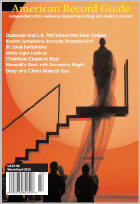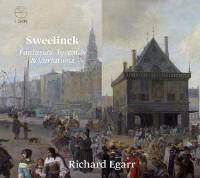Texte paru dans: / Appeared in: |
|
|
Outil de traduction ~ (Très approximatif) |
|
|
Reviewer: Bradley
Lehman Fantasia from Glenn Gould’s repertoire, along with several other fantasias having similar structure: slow melancholy counterpoint that gets filled up with increasingly frenzied divisions. He is terrific at holding these big pieces together.
In his booklet essay he makes
it obvious that he doesn’t want to sound like a performing scholar, though
he has done all his preparatory homework. To bring his own authenticity to
the venture, he has lived in Amsterdam (the composer’s own city) for 30
years, and he wants to convey its life. He chides other keyboardists (not
by name) for being generally too severe with this composer. It seems to be
a response to the 9CD set of Sweelinck’s keyboard music published by NM (S/O
2007). That boxed set was recorded in 1999-2001 by nine organists and six
harpsichordists (almost all Dutch), but not including Egarr. I’ve listened
to Egarr’s selected pieces as played by his colleagues in that set: accurate
with the notes, but interpretively cautious and under-characteri-zed. To
avoid this Dutch severity and make the music more sensuous, Egarr brings his
usual interpretive virtues and quirks to bear. He employs super-legato
“overholding” to smudge the notes together for more harpsichord resonance,
and he freely bends the rhythms in slow tempos. He uses the academically
proper old-style scale fingering, but not as an end in itself. (It wouldn’t
be good enough merely to pronounce words correctly, but one must have
something to say.) He deliberately de-synchronizes the plucking between the
high and low notes, sometimes by a lot. This technique makes the
contrapuntal lines sound independent. Many pieces have difficult parallel
sixths in one hand, and Egarr handles these with supple finesse. Overall,
his studied casualness sounds like relaxed play. He gives the last few notes
of long runs extra weight and time, as if thinking about what to improvise
next. All of this is like his compelling approach to William Byrd’s music
(S/O 2018). I’ve compared this with the similar single-disc Sweelinck
programs by Robert Woolley (Chandos, J/A 2009) and Glen Wilson (Naxos, S/O
2009). I also set up some blind randomized listening tests with two of
Egarr’s representative pieces (Fantasia Crommatica and variations on Esce
Mars), shuffling them amid recordings by five other harpsichordists. From
all of that, Egarr emerges as easy to listen to and recommend. I like
Woolley’s selection of pieces better, along with his rhythmic drive, but am
glad to hear the music in Egarr’s manner. He does what he set out to do. He
is a strong communicator who advocates well for these less familiar pieces
from his adopted home town. | |
|
|
|
|
Cliquez l'un ou l'autre
bouton pour découvrir bien d'autres critiques de CD |
|




